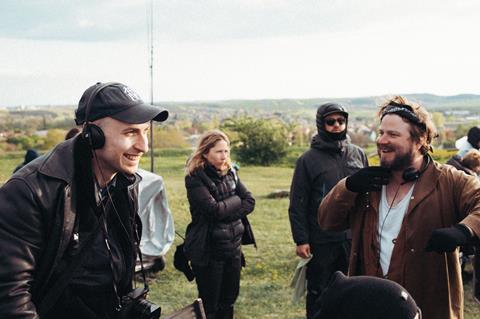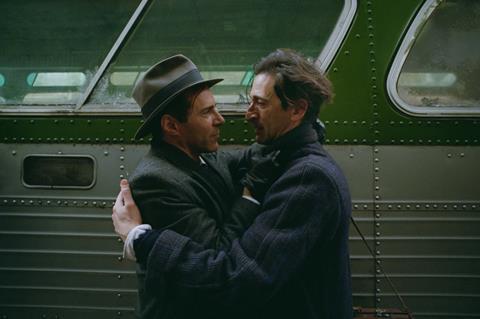
“I met Brady when he was putting together his first film,” says London-born musician, visual artist and composer Daniel Blumberg of Brady Corbet, director and co-writer of The Brutalist. This was back in 2014, when the actor-turned-filmmaker was casting his debut feature The Childhood Of A Leader. “We got drunk together. We had dinner, I took him to Cafe OTO [a recording and performance venue in Dalston, London], then he stayed on my sofa. We were drinking whiskey at 3:30 in the morning, and he had to wake up at seven for a casting session. He got in so much shit with the casting director because he turned up stinking of alcohol.”
The pair stayed in touch, and when Corbet was recording the score for The Childhood Of A Leader he asked Blumberg along to watch. A member of indie bands Cajun Dance Party and Yuck and the duos Heb-Hex and GUO, Blumberg would crash on Corbet’s couch whenever he was in New York, with Corbet later inviting him to the scoring session for his second feature Vox Lux, as well as providing the liner notes for GUO’s second album and making a 16mm short to accompany the record.
At the time, Blumberg, who has recorded under his own name as well as the pseudonyms Oupa and Hebronix, was a film aficionado, but had not thought of composing for movies until, in 2018, he was asked by Curzon Cinemas to create music for a trailer for an Agnes Varda retrospective. “The process was interesting,” he recalls. “I mainly work with improvising musicians and that was the first time working to picture and the limitations of that.”
Family affair
Norwegian writer/director Mona Fastvold, who is Corbet’s partner, heard Blumberg’s music for the Varda project and asked him to score her next film The World To Come, which premiered at Venice in 2020. Blumberg later won an Ivor Novello award for the score, which was recorded mostly in his flat in Stoke Newington, London with a handful of musician friends. By then, he was already working on The Brutalist, Corbet’s epic tale of Laszlo Toth (Adrien Brody) — a Hungary-born, Bauhaus-trained Jewish architect who survives the Holocaust and emigrates to the US to pursue the American dream — which he had co‑written with Fastvold.
“I thought it was a masterpiece when I read the script,” says Blumberg. “It felt so important, the whole project. It kept getting delayed but I didn’t take on any other films because I knew it would be full-on.”
When Corbet was trying to get The Brutalist financed, he put together a trailer and asked Blumberg to score it. “I went to Cafe OTO and they let me use their grand piano. I spent a day recording prepared piano. It’s where you stuff paper and screws in the strings. John Cage [the US composer and pioneer in the non-standard use of musical instruments] did it and, conceptually, it made sense because the piano has lots of hammers and it felt the right sound for the film.”
Corbet agreed, and when The Brutalist eventually started pre-production in Hungary, he asked Blumberg to join him, the composer moving into the spare room in his Budapest flat. “I’m used to living with Brady,” he says. “For me it’s all about the director, trying to be an extension of Brady’s instincts, so spending time with each other, living together, you might work something out over a coffee in the morning or a glass of wine in the evening. It’s like a weird kind of osmosis.”
As much as possible, Corbet wanted to play Blumberg’s music on set. For some scenes, such as the jazz club number, that meant hiring musicians, writing music, then performing it live. For certain others, it meant writing temp music that would be played while the cameras rolled. “The opening, when Adrien’s in the boat, then sees the Statue of Liberty, I was sitting with my keyboard, watching on the monitor, hearing the demo blasting out, watching Adrien move to it, because the camera could move to it.” Likewise, for Laszlo’s bus ride to Philadelphia, Corbet wanted to film to music. “He explained the shots to me and I couldn’t work out why,” admits Blumberg. “But it was good [to have] deadlines because they were like punctuation marks in my writing.”
Sound precision

Laszlo’s theme throughout The Brutalist is mostly piano. “Those sounds were built on a grid. At the start, there’s this kind of tick, tick, tick, tick precision. Brady and I talked about there being not too much ornamentation, about the Bauhaus, and how the piano can be this nostalgic, melancholy, intimate instrument. The composition of that came from me living with Brady. I can’t read or write music in terms of [classical] notation, so I fiddle with chords and record on a dictaphone so I can remember what I’ve done. There was this 20-minute recording of me doing the theme, then stopping and trying another chord, then dropping my vape. Brady heard it through the wall and got excited about that stopping and starting, which he used for the temp.”
Back when Blumberg first read the script, he had thought about UK pianist John Tilbury for Laszlo’s theme and later commissioned him to record the piano parts. “He is 88 and has this studio in his garden in Kent with a Steinway. I had one mic on him, a pair on the piano and two [other] mics in the room. It was a very natural recording sound. We wanted the presence of the pianist, and you hear him shuffling on his stool, taking notes.” Tilbury also plays on the 15-minute intermission that divides the three-and-a-half-hour film in two halves. “I moved in with John as well because there was so much work to do. Eventually I had to spend two‑and-a-half weeks with him.”
The Brutalist’s score is not limited to the piano, however. Blumberg uses strident blasts of brass to evoke Laszlo’s inner turmoil. “Brass could be warm and optimistic at the start when he’s on the bus to Philadelphia, then could also be harsh as he starts to disintegrate in the second half and gets more disorientated by his work,” he says. “I had [German trumpeter] Axel Dörner making these construction sounds. Steve Single, who mixed the sound, was sometimes confused about what was a trumpet and what was a sound effect.”
Laszlo’s story ends in 1980s Venice, where he receives an award at the Biennale. In contrast to the rest of The Brutalist, which was filmed in Vista Vision, this sequence is shot on early home video. “When Brady said he was going to shoot on that format, I immediately wanted to make the score suddenly change into this synthesizer score,” says Blumberg, who commissioned Vince Clarke (of Depeche Mode and Erasure fame) to do it. “I wanted there to be this shock of the first digital sound, because the whole score is acoustic recordings.”
The Brutalist has earned Blumberg his first Bafta nomination — one of nine the film landed. The composer has already moved on to his next project, reuniting with Fastvold on Ann Lee, The Woman Clothed By The Sun With The Moon Under Her Feet, a musical about the founder of the American Shaker movement, which she has co-written and produced with Corbet. “As soon as we finished the sound mix on The Brutalist, I was reading about the Shakers because I didn’t know who they were, and I had to write all the songs. So that’s been full-on. I’ve been working on it every day.”

























No comments yet